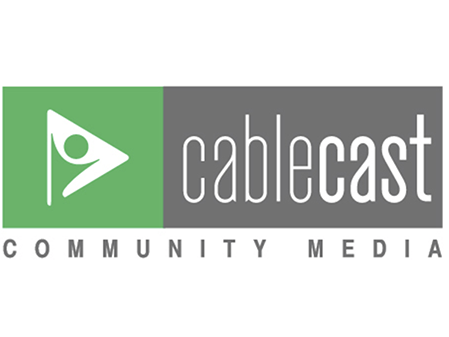“Flying over the Rocky Mountains with a sky that goes on forever…it sure beats working for a living,” said retired Captain Mark Ward.
Mark Ward waves at his wife, Karen, while covering an event.
Mark served as a commercial airline pilot for Midwest Airlines and Frontier Airlines for nearly thirty years. As he approached the federally mandated retirement age of 65, he started becoming more serious about his longtime interest in video. After he retired, he created a studio in his home and became involved in a number of projects.
Two years ago he decided to upgrade his gear and bought two JVC 620 cameras from Lee Drady at VSA Chicago, who happened to mention that Watertown Television had just purchased a similar model for its studio and that they were open to volunteers. “So I decided to call,” said Mark, “and I got a tour of the place. Everyone was so friendly and nice and open. And even though I’m not a resident -- I’m from Brookfield -- Karen Huismann said I was free to help out.” Watertown TV offers public access, which means that volunteers can check out the equipment to cover local events and produce other programming.
In the beginning, Mark would make the nearly two-hour round trip to Watertown to work on studio productions and crew on field productions. He did look into getting involved locally, but learned that the City of Brookfield didn’t have a PEG (public, education, and government) access center. “I think the community would love watching local programming, but the city just isn’t interested,” he said.
But after a short time he found that he preferred to use his own gear; he was used to it. So he started taking independent assignments to cover events and performances. He would drop off the footage and someone at Watertown TV would do the editing. But it didn’t always look the way Mark had imagined it. He realized he wanted more control over the finished product. Soon he was producing four-camera productions and editing them on his Final Cut Pro editing software. And that’s how he does it today. “I send Watertown TV the finished program. They review it and sometimes ask for a change here or there.”
“I find that the more you put into a project the better it comes out,” Mark said. “Sometimes I realize that I just put a lot of time into something, but I just enjoy doing it.”
Mark especially likes covering the action of band performances. His four-camera productions sometimes involve his wife Karen operating one of the cameras, but a lot of the time he just sets up shots on three cameras and he himself operates one. “I don’t want to be seen in a shot walking back and forth between cameras. I set one shot high and wide as a safe shot. If someone walks in front of a camera or stands in front of the camera and ruins the shot I normally don’t do anything about it. I don’t want to detract from the enjoyment of the audience.”
He priced the cost of an eight-foot tripod and decided to design leg extenders instead using PVC pipe. “They work perfectly,” said Mark. Each leg is outfitted with 3” diameter PVC pipe capped at the bottom. Bolts are run through drilled holes positioned 10” from the top of the pipe stopping the tripod legs from sliding down. Around the top he fits a piece of foam so the leg doesn’t move around. The pipes have been painted a discrete color.
He likes to think about how to make a program interesting so that “people will want to keep watching.” Sometimes it’s just making sure the content is really viewable, not only on a large TV screen, but also on an iPad or smartphone. Once he covered a speaker who projected his presentation on a big screen. The lights were lowered for the presentation so the speaker was poorly lit. Mark said, “Afterwards I contacted the speaker and got his PowerPoint. I inserted the visuals, sometimes filling the screen, other times just inserting the image to fill the space of the screen in the shot. It made such a difference in the show’s viewability.”
Mark has also learned to mix the audio he gets directly from the sound mixer with ambient sound in the room to get a “you are there” feel. “The audio directly from the sound mixer sounds sterile. When you mix in the room sounds and the audience reaction, the sound is more full and the event comes alive,” Mark said.
Mark likes to say he’s never worked a day in his life and while he works a lot of hours perfecting his shows, he’ll quickly say, “I don’t know if I’d call it work…” We’re looking forward to seeing a lot more local programming from this community producer.
In the Best of the Midwest Media Fest, Mark received a Merit Award for the program “Little Amerricka and the Whistlestop Campground.” Mark knows the owners. Four years earlier he had helped on another video project and decided to approach the owners with an offer to create an updated promotional video. “I wanted to show the place off and make the connection between the park and the nearby campground. And I wanted to try my hand at creating a show using short clips and fun background music. I open it with a map because who knows where Marshall, Wisconsin is! It really is a fascinating place. They actually build light rail trains there for clients like the Milwaukee Zoo. A customer has the option of ordering a 7 ½” gauge, 15” gauge or 16” gauge train powered by electricity, steam (heated by oil, coal or wood), gas, or propane.”









